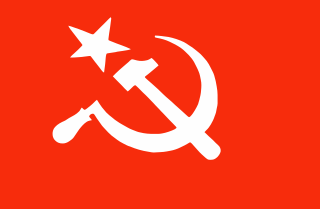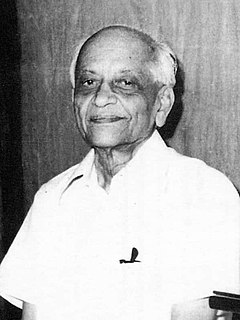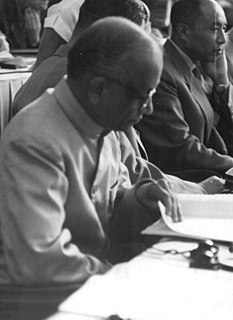Related Research Articles

The Communist Party of India (Marxist) is a communist political party in India. It is the largest communist party of India in terms of membership and electoral seats and one of the national parties of India. The party emerged from a split in the Communist Party of India (CPI) on 7 November 1964. As of 2022, CPI(M) is a part of ruling alliances in three states — the Left Democratic Front in Kerala, Mahagathbandhan in Bihar, and the Secular Progressive Alliance in Tamil Nadu. CPIM has representation in the legislative assemblies of 9 states.

The Communist Party of India (CPI) is the oldest communist party in India and one of the eight national parties in the country. The CPI was founded in Cawnpore on 26 December 1925.

The Communist Party of India (Maoist) is a Marxist–Leninist–Maoist banned communist political party and militant organization in India which aims to overthrow the "semi-colonial and semi-feudal Indian state" through people's war. It was founded on 21 September 2004, through the merger of the Communist Party of India (Marxist–Leninist) People's War and the Maoist Communist Centre of India (MCCI). The CPI (Maoist) are also known as the Naxalites, in reference to the Naxalbari insurrection conducted by radical Maoists in West Bengal since 1967. The party has been designated as a terrorist organisation in India under the Unlawful Activities (Prevention) Act since 2009.
Kanu Sanyal was an Indian communist politician. In 1967, he was one of the main leaders of the Naxalbari uprising and in 1969 he was one of the founding leaders of Communist Party of India (Marxist-Leninist). Sanyal committed suicide on 23 March 2010. He was born in a brahmin family

The Socialist Unity Centre of India (Communist) or SUCI(C), previously called the Socialist Unity Centre of India and "Socialist Unity Centre" is an anti-revisionist Marxist-Leninist communist party in India. The party was founded by Shibdas Ghosh, Nihar Mukherjee and others in 1948.

Shripad Amrut Dange was an Indian Politician who was a founding member of the Communist Party of India (CPI) and a stalwart of Indian trade union movement. During the 20th century, Dange was arrested by the authorities for communist and trade union activities and was jailed for an overall period of 13 years.
K. Ramani was an Indian politician. He was elected to the Lok Sabha in 1969, four times to the Tamil Nadu Legislative Assembly and was the Tamil Nadu State Committee president of the Centre of Indian Trade Unions.

POSCO India Private Limited is an Indian subsidiary of Korean conglomerate POSCO.

N. Sankaraiah is an Indian Communist Party politician and independence activist.
Kobad Ghandy is an Indian communist activist and ideologue. He became involved in revolutionary politics whilst a student in England in the 1970s, and worked as an organizer for the civil rights movement in India. He was a founding member of the Committee for the Protection of Democratic Rights. He was arrested on the accusation of being a politburo member of the underground Communist Party of India (Maoist) in 2009. He was acquitted and released after almost a decade in jail in 2019.
Bidya Chandra Debbarma was a communist politician from the Indian state of Tripura. A prominent leader of the communist movement in Tripura, Debbarma spent a total of nine years in jail and 13 years as an underground activist. A six-time state assembly member and minister in the state government, Debbarma never lost any election he contested.

Hare Krishna Konar was an Indian Marxist revolutionary, radical activist and Communist politician. Konar was a founding member of Communist Party of India (Marxist), and the leader to start the first land reforms and agrarian reforms in India as well as the chief architect of the West Bengal land and property distribution. In 1930s for making arms and bombs for the Jugantar group, he was deported to the Cellular Jail for 6 years at the age of 18 and there he took part in the first hunger strike and in 1935 he founded the Communist Consolidation and led the historical second hunger strike. Konar was the mentor of freedom fighters like Batukeshwar Dutt, Shiv Verma, Sachindra Nath Sanyal, Ganesh Ghosh, etc.

Saroj Mukherjee was an Indian freedom fighter and a member of the Polit Bureau of the Communist Party of India (Marxist). He was also the secretary of the West Bengal state committee of the Communist party.

Samar Mukherjee was an Indian Communist leader. who served as member of the Lok Sabha, the lower house of the Parliament of India for the Howrah constituency for three consecutive term, and as a member of the Rajya Sabha. He was a member of the Polit Bureau, member of the Central Committee of Communist Party of India (Marxist) and he was also the General Secretary CITU.

Nagbhushan Patnaik was known as a communist revolutionary from Odisha. Born in a middle-class family to Ramamurty Patnaik and Rajalaxmi Patnaik in Padmapur on 27 November 1934, Nagbhushan later participated in the Naxalbari movement and remained in its front ranks to determine the future course of communist revolutionaries. He was one among the few founders of CPI(M-L) who remained active till the end of their lives.

The Communist Party of India Red Star was formed in 2009 merging with various factions of CPI (ML), following the Bhopal Special Conference in 2009. with K N Ramachandran as the General Secretary, who has been reelected to the post in the 9th, 10th and 11th Congresses of the Party, which were held in 2011 at Bhubaneswar (Odisha) in 2015 at Lucknow & 2018 at Bengaluru (Karnataka) 5respectively.

Kanhaiya Kumar is an Indian political activist who served as the president of the Jawaharlal Nehru University Students' Union and leader of the All India Students Federation (AISF). He served as National Executive Council member of Communist Party of India. He joined Indian National Congress on 28 September 2021.
Sachchidanand Vishnu Ghate, also known as S.V. Ghate, was a freedom fighter and first General Secretary of the Communist Party of India. The Communist Party of India Karnataka State headquarters, Ghate Bhavan, is named in his honor.

In 1964 a major split occurred in the Communist Party of India. The split was the culmination of decades of tensions and factional infighting. When India became independent in 1947, differences arose of how to adapt to the new situation. As relations between the Nehru government and the Soviet Union improved, a faction that sought cooperation with the dominant Indian National Congress emerged within CPI. This tendency was led by S.A. Dange, whose role in the party hierarchy became increasingly controversial. When the Sino-Indian War broke out in 1962 Dange's opponents within CPI were jailed, but when they were released they sought to challenge his leadership. In 1964 the party was finally divided into two, with the left faction forming the Communist Party of India (Marxist). The split had a lot of regional variations. It also impacted other organizations, such as trade union and peasant movements. The split has been studied extensively by scholars, who have sought to analyze the various domestic and international factors involved.
Communists were actively involved in Indian independence movement through multiple series of protests, strikes and other activities. It was a part of revolutionary movement for Indian independence. Their main thrust was on organising peasants and working classes across India against the British and Indian capitalists and landlords.
References
- ↑ "CPI Central Leadership". Communist Party of India . Archived from the original on 18 January 2021. Retrieved 26 April 2021.
- ↑ "Abhay drops Dhinkia guard for son poll foray | Bhubaneswar News - Times of India". Archived from the original on 2021-10-05. Retrieved 2021-10-05.
- ↑ "Abhay Sahu: A comrade with infectious congeniality, can-do attitude". Archived from the original on 2021-10-02. Retrieved 2021-10-02.
- ↑ "Anti-Posco leader Abhay Sahoo arrested | Bhubaneswar News - Times of India". Archived from the original on 2021-10-02. Retrieved 2021-10-02.
- ↑ "Anti-Posco leader Abhay Sahoo walks out of jail after 7 months | Sambad English". 30 November 2013. Archived from the original on 2 October 2021. Retrieved 2 October 2021.
- ↑ "Tension Grips Orissa over CPI Leader's Arrest". Archived from the original on 2021-10-02. Retrieved 2021-10-02.
- ↑ "POSCO Protest Gets Further Intensified". Archived from the original on 2021-10-03. Retrieved 2021-10-03.